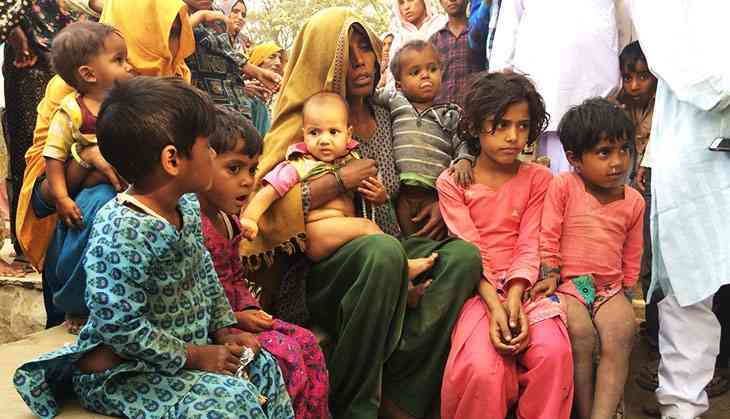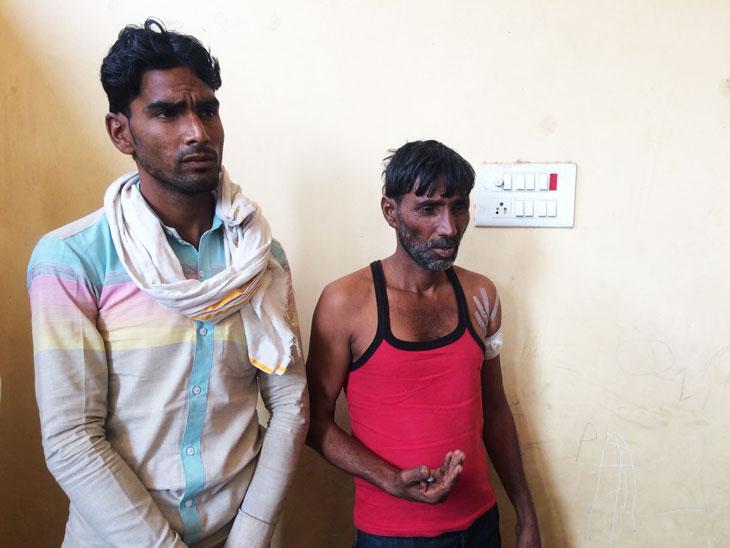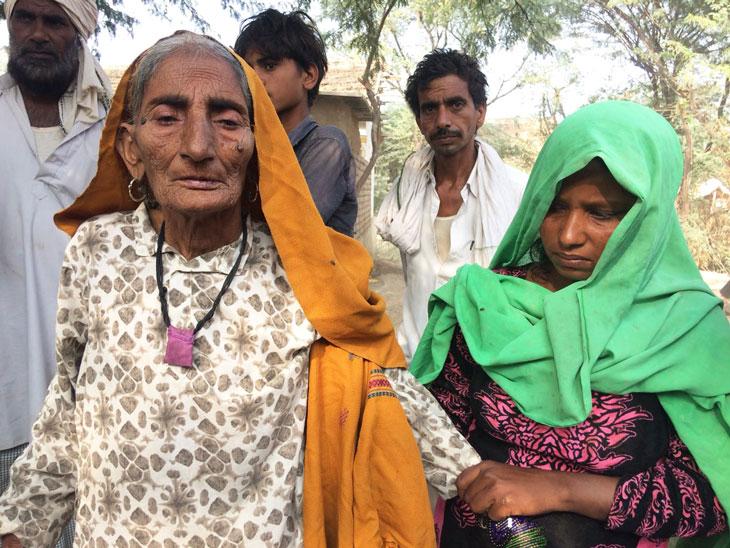Umar Khan murder: Eyewitnesses recount Gau Rakshak terror & Alwar police apathy

Umar Khan, a daily-wager and a small farmer from Bharatpur has become the latest victim of cow vigilantism.
“Thursday was the last time I heard from him,” Khursheedan, his wife says, as she continued to sob in the courtyard of her thatched roof house in Ghatmika village in Bharatpur. Khan’s dismembered body was found on the railway tracks in Alwar on Saturday. Before being dumped on the railway tracks in Govind Garh, he was shot at by suspected cow vigilantes, in Fahari on Friday morning.
Ramveer Gurjar and Bhagwan Gurjar have been arrested in the case according to Rahul Prakash, SP, Alwar. He says they have confessed to their role. A manhunt has been launched for the remaining four suspects even as Rajasthan Home Minister Gulab Chand Kataria promised strict action while claiming how it was not possible to control every situation at every place.
“Buying a buffalo is costly,” Khursheedan says. “We have eight children. My husband thought spending ten thousand rupees on a cow would at least ensure milk and ghee for the children and the family,” Khursheedan continued, clutching her kids. She still awaits the dead body which was sent to Jaipur for postmortem. The family has demanded arrest of all the accused and compensation from the government.
“We will launch a protest if the culprits are not arrested within 24 hours,” says Jamshed Khan a local Meo leader belonging to the Congress. Chief Minister Vasundhara Raje is touring the region till Wednesday. She is yet to speak out on the attack amidst allegations that Gau Rakshaks have the patronage of the ruling dispensation.
Eyewitness accounts
Umar Khan’s acquaintances, Tahir Ali and Javed Khan survived the attack.
“It was around five in the morning when we were returning from Dausa, that we suddenly saw five to six people alongside us, in a White Tata Sumo. They started firing at us indiscriminately,” Tahir says. Javed was driving, Tahir sat in the middle, while Umar was on the other corner seat. “Umar suddenly screamed ‘Goli lag gayi’,” he says. Within seconds Tahir realised that, he too, had been hit by a bullet.
In the mayhem, Javed Khan, who according to his version, was taken as a driver for Rs 500, opened the door of the car and rushed out. “I ran in the fields and managed to reach the nearby Meo village,” he says.
Tahir says he rushed out and ran into the fields. “They followed me. Hit my head with the butt and one Rakesh again pointed the gun to my chest. But others told him that I already have a bullet wound. So they just let me be,” he says showing the bullet which had hit him in the arm. His head has several stitches. “I, too, managed to get to the nearby Meo village,” he says.
It was only after Javed, who first got back to Ghatmika, followed by Tahir, that the villagers claim that they got to know of the attack.
“We rushed to the Police Station to ask for Umar Khan,” Ismail Khan, Javed’s father says. “The police merely told us that they have recovered the pickup, but no dead body. We went again on Saturday,” he says. It was only on Saturday that the local Station House Officer showed them photo of a dead body on his phone. “The body was badly disfigured. But they had recovered sandals and his clothes. It was through them that we recognised that it was Umar’s body,” Ismail Khan, Umar’s uncle, says. The FIR was filed by Ismail Khan.
The police’s lack of seriousness of can be gauged from the fact that they have neither recorded Javed and Tahir’s statement nor tried to ascertain the veracity of their accounts.
“The police have not approached us,” says Tahir. Strangely, he was treated at a private hospital. A proper medical examination by a government hospital, too, has not been done yet, he says. Till Sunday evening, the Alwar police had been claiming that both Tahir and Javed are absconding. This reporter found them in the village, talking freely to the media. Interestingly, Khursheedan says neither Tahir nor Javed told her about the happenings that morning.
When asked if any bullets were recovered from the scene of crime, SP Prakash said that the pickup has been sent to the forensic science lab (FSL) and they are waiting for the reports.
Eyewitness accounts

Umar Khan’s acquaintances, Tahir Ali and Javed Khan survived the attack.
“It was around five in the morning when we were returning from Dausa, that we suddenly saw five to six people alongside us, in a White Tata Sumo. They started firing at us indiscriminately,” Tahir says. Javed was driving, Tahir sat in the middle, while Umar was on the other corner seat. “Umar suddenly screamed ‘Goli lag gayi’,” he says. Within seconds Tahir realised that, he too, had been hit by a bullet.
In the mayhem, Javed Khan, who according to his version, was taken as a driver for Rs 500, opened the door of the car and rushed out. “I ran in the fields and managed to reach the nearby Meo village,” he says.
Tahir says he rushed out and ran into the fields. “They followed me. Hit my head with the butt and one Rakesh again pointed the gun to my chest. But others told him that I already have a bullet wound. So they just let me be,” he says showing the bullet which had hit him in the arm. His skull has several stitches. “I, too, managed to get to the nearby Meo village,” he says.
It was only after Javed, who first got back to Ghatmika, followed by Tahir, that the villagers claim that they got to know of the attack.
“We rushed to the Police Station to ask for Umar Khan,” Ismail Khan, Javed’s father says. “The police merely told us that they have recovered the pickup, but no dead body. We went again on Saturday,” he says. It was only on Saturday that the local Station House Officer showed them photo of a dead body on his phone. “The body was badly disfigured. But they had recovered sandals and his clothes. It was through them that we recognised that it was Umar’s body,” Ismail Khan, Umar’s uncle, says. The FIR was filed by Ismail Khan.
While the police have arrested one person, others still remain at large. The police’s lack of seriousness of can be gauged from the fact that they have neither recorded Javed and Tahir’s statement nor tried to ascertain the veracity of their accounts.
“The police have not approached us,” says Tahir. Strangely, he was treated at a private hospital. A proper medical examination by a government hospital, too, has not been done yet, he says. Till Sunday evening, the Alwar police had been claiming that both Tahir and Javed are absconding. This reporter found them in the village, talking freely to the media. Interestingly, Khursheedan says neither Tahir, nor Javed told her about the happenings that morning.
Police books victims
“It is a village of criminals,” a senior police officer from Alwar said about Ghatmika. “Tahir is a known cow-smuggler,” he said. Before the murder FIR was filed, the police which recovered the pickup, filed a case under state's anti-cow slaughter and smuggling law.
Meo Muslims form the majority of Ghatmika’s over 500 households. And locals say they are being continuously criminalised as “cow-smugglers”.
“There are many in the village who have been charged under anti-cow slaughter and smuggling laws,” Ismail says. “I too have two pending cases. Once I bought a milch cow from a neighbouring village when the police arrested me and had to spend a few days in jail. The next time I was not even present when the police falsely accused me of cow smuggling,” he says. In both cases, Ismail claims he had to bail himself out, and even had to pay the police.
Qasam, another villager narrated how two years back in the month of Ramaan he bought three cows from a relative in a nearby village. He, too, was caught by the police. “I spent 20 days in jail before I got bail,” he says.
In August last year, in neighbouring Firozpur Jhirka in Haryana, the local administration had collected samples of ‘beef biryani’ being sold openly. A recent report says seven samples tested positive for meat of ‘cattle species’.
Meos’ livelihood being targetted

A local, on the condition of anonymity, says while cow-slaughter is not something alien to this region, it does not make economical sense to slaughter milch cattle and that a lot of Meos depend on dairy farming for their livelihood.
“Most of the people are Zamindars,” the village sarpanch Shaukat Khan, says. Unlike in other parts ‘Zamindar’ in this village, surrounded by the Aravalis, is a term loosely used for anybody who owns land. Umar Khan and his three brothers, for example, have just two bighas of land shared between them, not enough for the survival of a family of ten. To make ends meet, Shaukat says, people take to rearing cows and goats. “Most households have a cow or two. Some have far more,” Khan says.
“Can’t Muslims also keep cows to make a living?” Saddam Khan, a young villager asks. “Each time they see us with a cow they automatically insinuate that we are carrying them for slaughter,” he rues. His friend Raqib, meanwhile, starts to show photos of tens of cows grazing in the Aravalis. “They are our cows. We sell their milk to make a living,” he says.
“Was Pehlu Khan, transporting dry cow that these Gau Rakhshaks lynched him,” Yaqoob Khan, a villager asks.
“These so called Gau Rakshaks are basically ‘goondas’ who snatch the cattle and the money. The cattle are again sold off by them,” Ismail says. “Things were not so bad when the Congress was in power. Since the BJP government came to power, the harassment has become worse. We will now have to stop dealing in cows,” Raqib says. “The police are either hand-in-glove or meek spectators,” he says.

